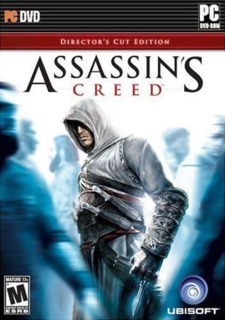Now that the game has finally hit the PC, I'm glad that I waited. Maybe this is just another case of me arriving late
Trouble begins with the plot. While the meat of the game takes place in the Middle Eastern Crusader kingdoms of the 12th century, that story is introduced with a cutscene-anchored plot device about searching for information through genetic memories. So while you're mainly stepping out in the sneakers of Altair, a ninja-like Islamic assassin plying his trade and killing nine public figures in the aforementioned medieval burgs during the Crusader occupation, you're also a 21st century bartender named Desmond Miles who's been kidnapped and hooked up to a geegaw called the Animus so that sinister scientists can peek at his brain. All of the events occurring in the game are just memories that you're recalling while laid out on a table. It's all sort of like Vanilla Sky with extra pretentiousness
Which is nifty…in theory. The story evolves into a grand conspiracy running through the centuries that's vaguely reminiscent of The Da Vinci Code, and rather entertaining if you don't look too closely at the multicultural-friendly "Muslims good, Christians bad" characterizations and dialogue. Using this sort of you-are-there gimmick to draw players into a fantastic world has worked well in the past, too. The Ultima RPGs, for instance, had the protagonist venturing to the fantasy realm of Britannia from our own world at the start of every adventure. Seeing some average schlub sucked out of his easy chair and into a magical gate set up a great, geeky "That could be me!" vibe.
Here, though, the modern stuff is too big of an influence on gameplay. Instead of just introducing the genetic memory claptrap and then ditching it for cutting throats in medieval Damascus, you're beaten over the head with sci-fi nonsense. Visuals are frequently interrupted by computer code that runs up the screen like blips in the matrix. Even something as simple as locking on to an NPC gives him or her a halo of funky electronic gibberish. Larger static-like glitches are even used as a gameplay device during cutscenes, as you're rewarded with a new camera angle if you click the mouse fast enough when this interference ripples across the screen.

